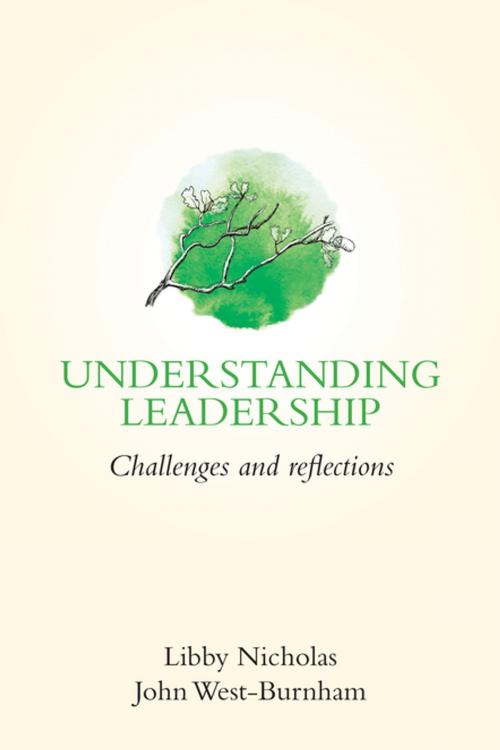Understanding Leadership
Challenges and Reflections
Nonfiction, Reference & Language, Education & Teaching| Author: | Libby Nicholas, John West-Burnham | ISBN: | 9781785830679 |
| Publisher: | Crown House Publishing | Publication: | March 31, 2016 |
| Imprint: | Crown House Publishing | Language: | English |
| Author: | Libby Nicholas, John West-Burnham |
| ISBN: | 9781785830679 |
| Publisher: | Crown House Publishing |
| Publication: | March 31, 2016 |
| Imprint: | Crown House Publishing |
| Language: | English |
Are current leadership roles and relationships appropriate in a rapidly changing world? Do we need to rethink key assumptions about leaders and leadership? Are you confident about the appropriateness and effectiveness of your chosen leadership styles and behaviours? These are questions facing leaders today and Understanding Leadership by Libby Nicholas and John West-Burnham can help find the answers, with an approach that is neither normative nor prescriptive but rather exploratory and developmental. Applying research and case studies from inside and outside the educational canon, Libby and John challenge prevailing orthodoxies and invite readers to reflect on their personal understanding as the basis for translating theory into practice. All leadership behaviour is based on a number of fundamental personal assumptions about the nature of human relationships and the basis on which human organisations function. Understanding Leadership helps leaders make their implicit understanding explicit and so informs and aids development of professional practice. Effective leaders develop and grow by understanding their personal mindscape – the mental map with which they make sense of the world – and developing it through reflecting, exploring, testing and questioning. The usefulness of any map is determined partly by its scale and partly by the information it depicts. As leaders develop, so their personal mental maps become more sophisticated and more detailed. The purpose of this book is to help leaders understand and refine their maps through reflective self-awareness – facilitating the journey to understanding leadership. Leadership is fundamentally concerned with the complexity of human relationships, performance, engagement and motivation – leadership has to be seen as relational. Leadership involves emotional engagement and sophisticated interpersonal relationships. The idea of a hero-leader single-handedly transforming a school is perhaps not a particularly useful or relevant vision of effective leadership for today. Libby and John encourage leaders to arrive at their own working definition of effective leadership and analyse how the myriad of carefully examined models and case studies might apply in their own school context. The eight chapters are underpinned by the following themes, questions and points of reflection: why leadership?; creating a preferred future – leading change; leadership as a moral activity; learning as the core purpose of school leadership; leading through collaboration and cooperation; building capacity – sharing leadership; leading through relationships; and leadership and personal resilience. High performance, effective leadership can be truly transformational. Leadership cannot be taught; it has to be learnt. It could be argued that school leadership is primarily concerned with learning: the leader’s own, and facilitating that of the children. Questioning, interrogating and analysing ideas and practice are fundamental to that learning process. Libby Nicholas and John West-Burnham prompt leaders to do just that. Suitable for school leaders at all levels – head teachers, principals, assistant and deputy heads, middle leaders aspiring to senior roles – and in all educational settings. The book will also be of interest to education system leaders – chief education officers and directors of education – and, indeed, anyone concerned with developing effective school leadership; for example, governors and trustees, CPD trainers, coaches and mentors.
Are current leadership roles and relationships appropriate in a rapidly changing world? Do we need to rethink key assumptions about leaders and leadership? Are you confident about the appropriateness and effectiveness of your chosen leadership styles and behaviours? These are questions facing leaders today and Understanding Leadership by Libby Nicholas and John West-Burnham can help find the answers, with an approach that is neither normative nor prescriptive but rather exploratory and developmental. Applying research and case studies from inside and outside the educational canon, Libby and John challenge prevailing orthodoxies and invite readers to reflect on their personal understanding as the basis for translating theory into practice. All leadership behaviour is based on a number of fundamental personal assumptions about the nature of human relationships and the basis on which human organisations function. Understanding Leadership helps leaders make their implicit understanding explicit and so informs and aids development of professional practice. Effective leaders develop and grow by understanding their personal mindscape – the mental map with which they make sense of the world – and developing it through reflecting, exploring, testing and questioning. The usefulness of any map is determined partly by its scale and partly by the information it depicts. As leaders develop, so their personal mental maps become more sophisticated and more detailed. The purpose of this book is to help leaders understand and refine their maps through reflective self-awareness – facilitating the journey to understanding leadership. Leadership is fundamentally concerned with the complexity of human relationships, performance, engagement and motivation – leadership has to be seen as relational. Leadership involves emotional engagement and sophisticated interpersonal relationships. The idea of a hero-leader single-handedly transforming a school is perhaps not a particularly useful or relevant vision of effective leadership for today. Libby and John encourage leaders to arrive at their own working definition of effective leadership and analyse how the myriad of carefully examined models and case studies might apply in their own school context. The eight chapters are underpinned by the following themes, questions and points of reflection: why leadership?; creating a preferred future – leading change; leadership as a moral activity; learning as the core purpose of school leadership; leading through collaboration and cooperation; building capacity – sharing leadership; leading through relationships; and leadership and personal resilience. High performance, effective leadership can be truly transformational. Leadership cannot be taught; it has to be learnt. It could be argued that school leadership is primarily concerned with learning: the leader’s own, and facilitating that of the children. Questioning, interrogating and analysing ideas and practice are fundamental to that learning process. Libby Nicholas and John West-Burnham prompt leaders to do just that. Suitable for school leaders at all levels – head teachers, principals, assistant and deputy heads, middle leaders aspiring to senior roles – and in all educational settings. The book will also be of interest to education system leaders – chief education officers and directors of education – and, indeed, anyone concerned with developing effective school leadership; for example, governors and trustees, CPD trainers, coaches and mentors.















